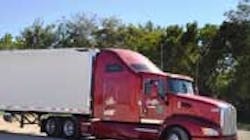PremierCare Connect helps Proffer Produce control costs
Once a year, Proffer Produce owner and president Benjy Proffer examines his maintenance shop’s profit-and-loss reports to determine which equipment to replace based on the amount of money spent on repairs.
It’s all part of a supply chain management strategy to control operating costs so the company can deliver fresh produce cost-effectively from growers and its own growing operations in 12 regions throughout the Midwest. The company also sources produce from growing operations in Mexico, the Dominican Republic, and Costa Rica. In most cases, product is picked, packed, and shipped the same day, and delivered to stores the next day, so customers can enjoy farm-fresh produce, particularly during the summer.
“By controlling costs in our supply chain, we can buy the freshest and best quality produce from farmers at prices that help them increase their profits and still be able to offer them to retailers at prices that allow them to maintain or even lower retail costs at the store level,” Proffer said.
Central to controlling those costs is the Kenworth PremierCare Connect system, an online fleet management program that helps the company’s shop manage its parts inventory, including maintenance, fuel, and tires for its fleet of 46 trucks—nearly all Kenworths—and for its 55 refrigerated and dry van trailers. To reduce fuel costs, Proffer Produce has also started replacing its older Kenworth W900L units with 20 of the more fuel-efficient, aerodynamic T660 units.
“When our dealer (Kenworth of St Louis) first presented the Connect system to us, we saw it as an opportunity to increase our maintenance shop’s productivity,” Proffer said. “Now that we’ve used the system for two years, I’m convinced that adopting this system was an excellent idea.”
Proffer Produce is a family-owned and operated full-line wholesale produce company founded in 1964 by Benjy’s father, Udell Proffer, who supplied a single retail store out of the trunk of his car. Today, the company operates a network of three sales offices, three warehouse locations, and 11 growing and shipping operations scattered throughout the Midwest and Arizona. The company’s 100,000-square-foot distribution warehouse in Park Hills MO, which is also home to its maintenance shop, is the hub of that network.
Proffer’s trucks and trailers are operated by three divisions: Proffer Wholesale, Proffer Express, and Proffer Transportation. The PremierCare Connect system tracks the maintenance and parts for those trucks and trailers. It also tracks parts and maintenance for the company’s washing, sorting, and packaging machinery and the pallet jacks, forklifts, and other warehouse equipment.
PremierCare Connect, which is used by nearly 300 fleets representing about 23,000 trucks, offers preventive maintenance tracking and in-depth reporting in addition to electronic parts purchasing. Connect provides convenience and reliability via multi-user, multi-location functionality and training and technical support. It also offers scalability, as well as limited customization, with options and features companies can add as their needs change.
Proffer Produce’s Tracy Simmons uses Connect to produce a weekly profit-and-loss progress report, which provides Benjy Proffer and fleet manager Ron Slade a detailed look at work and parts orders. Since the company’s trucks and trailers are assigned to specific divisions, the Connect system helps the company assign the costs to the right division.
“After we got the Connect system, it took me less than an hour to come up with those numbers instead of the several hours it took using the old fleet management program,” Simmons said.
When Proffer asks for the annual report, Simmons said he can easily produce it in one afternoon instead of spending several nights poring over spread sheets and calculations. Since Connect is managed online, Simmons also doesn’t need to worry about updating or reloading software or backing up his data.
He said the Connect system’s optional bar-code scanner and parts inventory management functionality helps the maintenance shop keep track of parts as mechanics take them from the company’s inventory.
Also, when the shop runs low on parts, the Connect system automatically places an inventory replenishment order in the queue for his review and approval. In conjunction with that feature, Connect also offers a “consigned inventory” management function that is used by Kenworth of St. Louis. Under the program, the dealer stocks parts on Proffer’s shelf, but doesn’t bill the company until the parts are used.
Simmons agrees that Connect will make it easier for the company’s maintenance shop to comply with the requirements of the Federal Motor Carrier Safety Administration’s Comprehensive Safety Analysis 2010 (CSA 2010) program when they are implemented this autumn. CSA 2010 places greater significance on truck maintenance and includes more stringent penalties for violations. It also requires carriers and private fleets, including Proffer Produce, to track needed repairs, particularly ones identified by company drivers.
